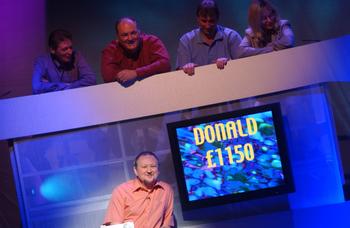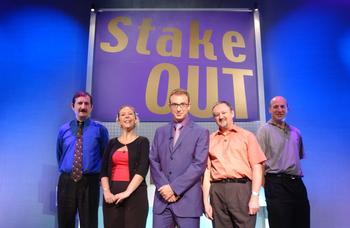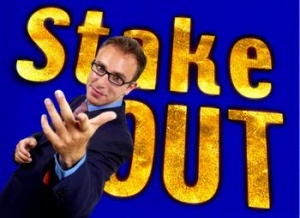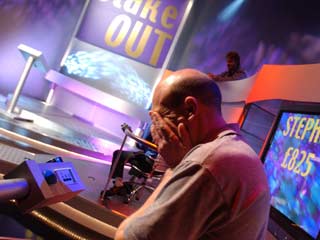Stake Out (1)
(→Trivia: add) |
(→Trivia: add) |
||
| Line 31: | Line 31: | ||
According to former contestants of the show, the idea ran into legal problems and the producers ended up stumping up the stake money for all the contestants instead, at a cost of £30,000. | According to former contestants of the show, the idea ran into legal problems and the producers ended up stumping up the stake money for all the contestants instead, at a cost of £30,000. | ||
| - | Early publicity for the show implied a contestant could win up to £25,000. With starting stakes of £250 each doubled, and then potentially doubled again if everybody gambled all of their money and got everything right, that's still only a jackpot of £4,000 for each game, effectively a £1,000 per episode shortfall. Hmm | + | Early publicity for the show implied a contestant could win up to £25,000. With starting stakes of £250 each doubled, and then potentially doubled again if everybody gambled all of their money and got everything right, that's still only a jackpot of £4,000 for each game, effectively a £1,000 per episode shortfall. Hmm. The highest amount won in any game was £3,450. |
Episode 30 was about six minutes longer than the previous 29 episodes, to allow the players to finish their game. Repeats of that episode still give an address to apply for the show even though new episodes stopped being broadcast in 2001. | Episode 30 was about six minutes longer than the previous 29 episodes, to allow the players to finish their game. Repeats of that episode still give an address to apply for the show even though new episodes stopped being broadcast in 2001. | ||
Revision as of 14:57, 9 May 2020
Contents |
Host
Anthony Davis
Broadcast
Flextech for Challenge TV, 12 November 2001 to 21 December 2001 (30 episodes in 1 series)
Synopsis
Quiz show where people apparently staked £250 of their own money (which was then matched by Challenge, although reports suggest that they discovered asking people to stake their own money wasn't legal quite late in the day and they put up all the money) in order to play. If other people "backed" the player by lending him the money, they would watch the proceedings from the gantry.
 Or to put it in perspective, a bad day's prize money on Weakest Link.
Or to put it in perspective, a bad day's prize money on Weakest Link.Four individuals played, and aimed to bankrupt their three opponents. In the opening round, All In, players staked £75 each on four multiple-choice questions and correct answerers split £300; if everyone got it wrong, it was carried into the next question except on question 4, where the whole £300 would be offered on a buzzer question. In the second round, Cashing In, players were offered a multiple choice question in turn, and could bet any amount of their pot; correct answers doubled their stake, incorrect answers saw their stake offered to their competitors on the buzzers. In the third round, Face Off, contestants faced a player of their choice on a choice of five categories, replaced after everyone has faced someone (so when there's only one category left) and could stake up to their opponent's pot provided they could match it. When two players remain, the final round, All Or Nothing, players play on the buzzer; minimum stakes start at £100 and rise in £100 increments until they reach £500 when they start rising by £250. When one player can't match the minimum stake, players play for the lower pot. Winners would win over £2,000 a game and could return up to four times (a total of five games), reinvesting £250 a go.
Inventor
The Chatterbox Partnership
Trivia
According to former contestants of the show, the idea ran into legal problems and the producers ended up stumping up the stake money for all the contestants instead, at a cost of £30,000.
Early publicity for the show implied a contestant could win up to £25,000. With starting stakes of £250 each doubled, and then potentially doubled again if everybody gambled all of their money and got everything right, that's still only a jackpot of £4,000 for each game, effectively a £1,000 per episode shortfall. Hmm. The highest amount won in any game was £3,450.
Episode 30 was about six minutes longer than the previous 29 episodes, to allow the players to finish their game. Repeats of that episode still give an address to apply for the show even though new episodes stopped being broadcast in 2001.
Pictures
 Don't forget the serious yet goofy Anne Robinson stare.
Don't forget the serious yet goofy Anne Robinson stare.




